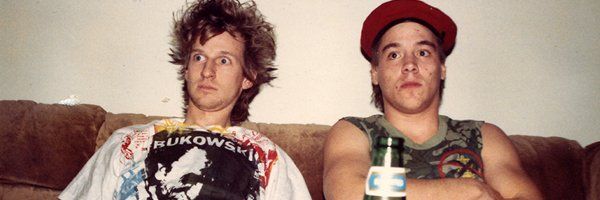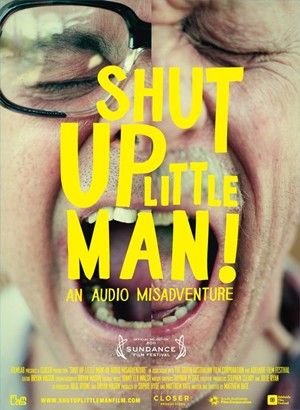The documentary Shut Up, Little Man tells the story of when two friends tape-recorded the fights of their violently noisy and belligerent neighbors and accidentally created one of the world’s first viral pop-culture sensations. In 1987, Eddie and Mitchell moved to San Francisco, next door to Peter Haskett, a flamboyant gay man, and Raymond Huffman, a raging homophobe. Fearing for their lives, they began to tape record the alcohol-fueled rants through the paper thin walls of their apartment, never knowing what to expect next. Passing copies along to their friends, the tapes went on to inspire a cult following, spawning sell-out CDs, comic artwork by Dan Clowes (Ghost World), stage plays, music from Devo, and interest from Hollywood. Now, this life-changing experience is chronicled in a darkly hilarious story that is totally unbelievable and yet entirely true.
During this exclusive phone interview with Collider, Eddie Lee Sausage (born Edward Guerriero) talked about how this documentary came about, what made filmmaker Matt Bate the right guy to showcase this crazy journey, how difficult it was to go about their daily life with so much animosity and hostility going on next door, and how he doesn’t feel that they invaded these two men’s privacy at all, as their own life was being invaded. Check out what he had to say after the jump:
Question: How did this documentary come about? Did you want to go back and document the journey that this took you on, or were you approached with the idea?
EDDIE LEE SAUSAGE: We were approached by (writer/director) Matt [Bate]. Coincidentally enough, I had dutifully ignored Shut Up, Little Man for literally about 10 years. I had a break in work and I put a year and a half into working up a comprehensive website, and it took a long time to pull all the archives, fan paintings and images, etc. It was strange because I actually got the website functional and working and I told my wife, “This is going to go up and someone is going to want to do a movie.” Literally six weeks later, Matt called me and said, “Ed, I’ve just seen your website and I want to talk about doing a documentary.” We’d been approached several times in the past, and whenever it got to the point where I was seriously considering doing the documentary, I’d say, “Send me something you’ve done,” and it would be so shoddy. I didn’t want to subject the material to someone who really wasn’t a good filmmaker. So, we saw Matt’s previous two films and they were exceptionally well done. I liked the content and I liked the style and it fit the material, so we said yes to it. I think the film benefitted greatly from the fact that I had gone back and really thought through the history of Shut Up, Little Man and documented it on the website, so it was very fresh and very timely. This was almost 25 years ago.
Did you collaborate with Matt Bate, once you had decided to go ahead with this, or was he more of an observer?
SAUSAGE: That’s a good question. I told Matt that I would not do the film unless we were collaborators. If you watch the film, I don’t know how clear it is, but we have been screwed over by so many people, so it was difficult to trust. We slowly built trust. Then, when the film got into Sundance on a rough cut, there really wasn’t time for us to confer on the level we would like to have, so that was sort of heartbreaking for me. But, it is what it is and it’s out there, and I think it is a really well done film, and it’s entertaining.
At what point did you realize that maybe you should have copyrighted this material?
SAUSAGE: First of all, the recordings were made literally as an in-joke between Mitchell and I, who were more like brothers than we even are friends. And then, we had a very small circle of friends, of no more than seven people, that we were sharing them with, but all those people went, “Jesus, I can’t sit on this. This stuff is crazy. It’s hilarious and disturbing and complex and crazy.” So, it went on from there. Throughout the whole history of Shut Up, Little Man, my whole thing was to get evangelist about the gospel of Peter [Haskett] and Raymond [Huffman]. We shared it with every single person who ever asked us to use it, for free. That included people like Gregg Gibbs, who made a play, and Mike Mitchell, the director of Shrek Forever After, who did the little puppet movies, and Devo, and on and on. Tons of people used it for free. When we went to Hollywood and they said, “So, who owns the copyright?,” we were like, “Well, we never copyrighted it. We’ve given it away to everybody.” They gasped and made us copyright it, essentially. So, when we copyrighted it and trademarked it, it didn’t change what we did. Even in the last month, I’ve given permission to three people to use it on their records for free. I think the film accentuates the commercialism of it and maybe some type of exploitation, but the truth is that everybody got it for free.
How and when did you and Mitchell D first meet, and what made you decide to go to San Francisco together?
SAUSAGE: Mitch and I are very similar people. Our stepfathers were high up at a corporation, so they brought us together when we were 14 years old. Because he was a longhaired guy who into Pink Floyd and I was into the Clash, you’d think that we wouldn’t really get along. My girlfriend was his sister’s best friend, so we kept bumping into each other. I decided I was going to move to California. I had spent some time in San Francisco and I loved it there, and I was really obsessed with the Beat writers and that was out in San Francisco. So, I ran into him at a bar and said something like, “I’m going to California,” and he said, “So am I.” I said, “Where are you going?,” and he said, “I’m going to the San Diego area.” I said, “Why are you going there?” He said, “My buddy, Bruce, lives there.” I said, “That’s funny, I’ve going to live with Bruce and he lives in Oakland.” So, we realized that we were both going out there, even though he thought it was in a different city. We called Bruce and decided to go together.
Once you ended up in this apartment and started to hear these arguments, what made you decide to stay there and deal with it, instead of just leaving?
SAUSAGE: The principle reason was that we were incredibly poor. Everybody in that neighborhood was incredibly poor, and everybody who lived in that building was the poorest of the poor. We were all stuck there because of economic imperatives, really. I don’t think most people would have lasted a month. The ironic thing was that, after we signed the lease, the landlord said, “Oh, by the way, the next door neighbors are sometimes a little bit loud.” We smiled, she left and we high-fived each other and said, “Thank god!,” because we were always the loudest people, playing punk rock at really high decibels. We thought, “Oh, this is great! We’re never going to get in trouble here, if the neighbors are loud.” Little did we know that they were the most obnoxious, belligerent, violent people we’d ever encounter.
Was it difficult to go about your daily life and keep some sense of sanity, with so much animosity and hostility going on next door?
SAUSAGE: Yeah. There are two levels. One is that I had a very romantic notion of being down-and-out. I was really in love with the Beat writers and they were living a Beat generation life, down-and-out and drunk all the time and not working. One part of me was like, “Wow, this is front row to the Beat generation.” Simultaneously, it was incredibly exhausting and maddening. When I first went over and knocked on the door of Raymond’s apartment at three in the morning and told him to keep it down because they had been fighting for three days, I was in an altered state because I hadn’t slept for three days. My bedroom shared a wall with their bedroom, and I just could not sleep. I was out of my mind. I weighed 115 pounds. It was hard. It was so assaultive. It really impacted my consciousness on a fundamental level. The first time I ever stepped outside of the apartment without Mitch – he had a job and I didn’t – a guy literally walked up to me and said, “My advice to you is to go back in your house, or you’re going to get killed.” And, it wasn’t Pete and Ray. It was some other guy. I went right back in the house and was like, “I can’t even leave the house, this place is so bad.”
Were you surprised that these guys barely paused in their arguments to notice that you were recording them, but then went right back to arguing with each other?
SAUSAGE: Yeah. It’s funny because I think it’s a testament to the raw passion that they had for one another. It transcended all rationality. There was another thing that we did that might be in the DVD extras where, after three days of fighting again, we took the speakers from our apartment and put them out in front of their front window, and we put a tape in of them fighting and cranked it up, and we thought, “Well, this is one way to get them to shut up after 72 hours.” This is crazy, but honestly it happened. Instead of quieting down or being ashamed or being sobered or reflecting, they actually started fighting louder than the recordings that we were playing back, over who sounded like the biggest asshole.
Do you see this whole experience as a precursor for today’s viral phenomenon, with everybody recording everything and putting it out there for the world to see?
SAUSAGE: I think it’s a precursor to that and to reality-based entertainment. I think there’s something so raw and authentic about the recordings that it transcended the usual thing. Because there are 14 or 15 hours of recordings, it’s richer than just a momentary thing, but at the same time, it is a precursor.
Looking back on all of this, do you see any moral issues about having recorded these guys? Do you feel like you were invading their privacy at all, or do you think that you were entitled to do this because it invaded your life as well?
SAUSAGE: The ultimate reality is that their conversations were absolutely not private. They invited our privacy with their obnoxious, belligerent rants. There is a poetic justice. If you’re yelling for the whole to hear you, then now the whole world will.


